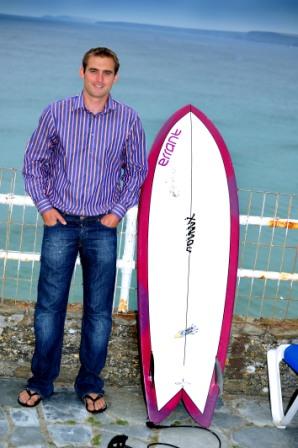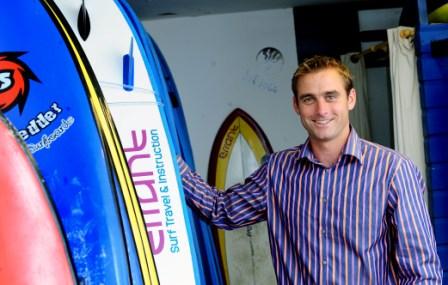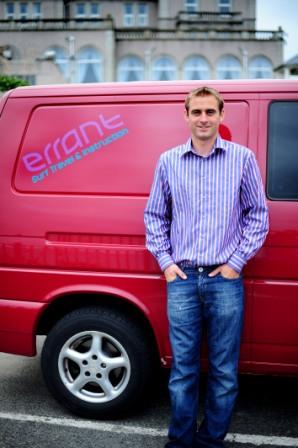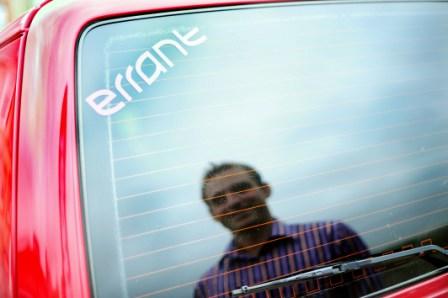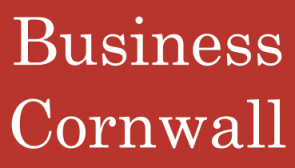Norman Tebbit (remember him?) would be proud of Errant Surf founder and MD Chris Thomson.
While Thomson may not have literally used pedal power to get down to Newquay from his Isle of Wight family home, he has shown admirable get up and go. Leaving school at 16, Thomson had just one thing in mind – surfing.
And he has never looked back. From getting a job as a surfing instructor, he has single-mindedly devoted all his time and effort into building up Errant Surf into a niche travel company that operates around the world, with a turnover in excess of £300k and rapidly growing.
Thomson, who won Young Businessman of the Year title at the 2009 Cornwall Business Awards, explains what drives him on, some of the challenges he has met along the way, and why he now finds it a little harder to travel as much as he would like.
Business Cornwall: Errant has a few strings to its bow now, how does business divide up?
Chris Thomson: The travel company is one company, and the surf school is a different operation where we also do the life guard training. We are also launching online travel store and surf shop. All fall under the same brand.
BC: How long has all this been going?
CT: It’s in its fifth year as it is now, a couple of years leading up to that when I set up the surf school, I was coaching for another surf school down here. I got some sponsorship money from Fat Face for my own surfing which gave me time. It wasn’t a grand amount of money, but it meant I didn’t have to work so much and I used that time to build the business.
I started offering high level private surf tuition, which at that time was quite unique. I tended to be working with the same people, building up a good rapport with them. And because I was travelling quite a bit as well, they would often ask where they should go away on holiday surfing and it flowed on from that.
BC: Not a typical sort of travel company I assume?
CT: It varies. We work with companies in Bali, for instance, that need a European representative. We have contracts in at exclusives resorts such as the Malidves, and we run our own place in Spain, with a guest house, bar and surf school. And we also deliver surf tours. We would take a group of people from Europe to say Sri Lanka and travel with them. A mixture of many different components of the travel industry all moulded into one.
BC: Quite bespoke?
CT: Yes. For example, we get a lot of families and couples. A family might say we’ve got a little boy who wants to surf, our little girl wants to go horse riding, but we want to stay in a nice hotel, we’ve got this amount of money. So we’ll pool our resources and make it happen.
BC: You must have a lot of contacts and knowledge from around the world. How did you build this up?
CT: I have always travelled since leaving school at 16, working through the summers and travelling through the winters. I travelled a lot more when I was surfing for Fat Face, and at the same time doing odd bits of work for surf schools in Barbados and Morocco. And it’s quite a small network, so it didn’t take long before you got a good handle on who’s where in different parts of the world.
BC: Do you do much travelling now?
CT: Yes, but it has slowed down in the last year because of the twins. I enjoy travelling as much as or even more than surfing itself. They really go hand in hand. Surfing can really take you off the beaten track. You can surf anywhere in the world almost. We were up in Orkney over Christmas, surfing there. There’s a lot of expedition stuff. It’s a bit different from pulling up at Fistral and getting your surf mat out.
One of our most popular locations is Morocco. And because they are surfing holidays, the areas that we go to is quite a way from the touristy towns that are better known. Same with Portugal, you are always away from the more seaside resorts.
BC: So quite different from here in Newquay?
CT: Yes, but there are also places like Biarritz and Malibu in California, so it does vary a lot. Each one is different.
BC: Is there much competition to a business like this?
CT: There’s a healthy amount of competition, but no one is doing exactly what we’re doing. There might be an Australian travel agency for instance, but they won’t be coaching their own clients or delivering their own surf tours. Or there might be a company up the road who deliver their own life guard courses, but they won’t have anything to do with travel.
BC: How many staff do you have?
CT: It varies because it is so seasonal. There’s a core team of three of us here who do the admin, an IT director, and we’re about to take on a finance director. And then we have the coaching team, which will fluctuate depending on what’s happening.
BC: And how do you manage your own time? Is it increasingly spent managing the business?
CT: That classic scenario of finding myself answering the emails. I’m trying to pull away from that and manage it and let it grow a bit more. We’ve trained Charlotte [Chris’ wife] up to handle enquiries and that sort of thing so the day to day running can almost be left and the IT systems we now have allows it to be more automated and easier to track.
And we now have the online surf store about to go live and from that point it will be a case of pulling back, having a top tier team with the IT director and finance director.
BC: What sort of turnover does the company have?
CT: Last year it was just under £300k.
BC: How big can you grow?
CT: When the surf shop opens we will have some pretty stiff competition. There’s a company in London who runs a big online surf shop and they’re projected sales this year is £11 million!
BC: You have to aim big!
CT: There are companies like Sunsail and Nielson who have started in the exactly the same way as us. A small sailing school and a small windsurf school and over time built it up and sold it to the one of the big tour operators. At the moment there’s no one who offers surfing like we do and it’s a hugely popular water sport. Anyone can do it, from 4 to 64.
BC: Do you know how many actually do surf?
CT: It’s really hard to get those proper numbers, it depends how people classify it. It can be anything between half a million to a couple of million, and that’s just in the UK. The amount of people who surf on a regular basis will be a lot less. 87% of our customers live outside the south west and surf two or three times a year.
BC: How seasonal is your business?
CT: You could quite easily draw a chart for the different elements of the business and you would have defined peaks and troughs. The travel company lead up to Christmas is dead, because no one is thinking of going away. January and February it goes through the roof, but the surf school is still quiet. One of the reasons we’ve set up the surf shop is now hopefully that lead up to Christmas will be one of our peaks.
The business has never had any investment, just time. It’s a long way of doing it, it has taken time to get it out there. Never run a business before, everything we have done has been a learning experience. Some of the stuff you learn in the first year and look back on now, it’s just hilarious.
But I was mad keen on the idea of the business.
It didn’t have any boundaries, would go as far as you want to push it and sat really nicely with the other interests I had.
BC: If you weren’t doing this, what do you think you would be doing?
CT: (Long pause) School boy fantasies? Fighter pilot, F1 racer! To be honest I haven’t got a clue. There always seems to be a way of making a bit of money without having to go to work!
BC: You’ve never seen yourself in a regular 9-5 office job somewhere?
CT: No. That’s why I left school at 16! I was just bored of waking up in the day and knowing that would be my day. I passed all my GCSEs with good grades, but all my reports were the same – ‘Chris could really achieve stuff if he finds interest and put his mind to it.’
I had been surfing since the age of nine, so I knew I didn’t want to live on the Isle of Wight anymore – I wanted to live in Cornwall, and I knew that studying GCSE German wasn’t going to help me in anything I wanted to do.
So I came down to Cornwall when I was 16, stayed at Fistral Backpackers, got a couple of little jobs until I qualified to teach. Then I was working all summer to save a £1000 to make last and travel through the winter. I’ve no idea how you could do that now, especially with three kids!
BC: What have been the biggest challenges from the business side of it?
CT: It’s a continuing learning curve. There are some key moments which are really tricky when you start up a business, especially on your own, such as employing your first person. In the first years of setting up, it’s very personal, you put so much time and effort into it. So one of the hardest things I have had to do over the past couple of years is detach myself from it. It’s a bit like having a relationship. The relationship I had before with Errant was really intense, really personal, whereas now I can take it or leave it.
I can jump in, and then turn around go out for the afternoon and not to have to worry about it. It’s almost like having a baby. For the first couple of years, you spend all your time worrying, but later on, you still look out for them, but you have to let go more. It’s a continuing learning curve.
When you look back at how you started off and at the things you did, wrote etc, it’s amazing. Every now and then we pull up our old website, there’s a web site – www.archive.org – you put in the domain name and see the older versions of web sites. If you do that with our one and go back as far as you can, and compare the two, it makes you cringe! And we’ll probably cringe at what we do now if we look back in ten years time!
BC: With the majority of your business out of county, how do you promote yourselves?
CT: A lot of it is online. We’ve worked pretty hard on search engine optimisation; we do a lot of cross brand promotions, linking up with companies like Fat Face. And we’ve got a reasonably strong brand and presence within the surfing industry. If a family in Manchester is talking about going surfing, for example, nowadays someone usually knows someone that surfs and that person may say check out these guys, I’ve seen them in the surf magazines.
BC: Do you still do much teaching yourself?
CT: Less so now. I’ll do the surf coaching courses, because I am a trainer assessor and there are only about seven or eight trainer assessors in the UK. I coach people I’ve coached before from years ago, privately. It’s just nice to mix it up and when the weather’s nice as it is now, it’s good to get down there rather than just sit in the office.
BC: And you still lead trips abroad?
CT: Yes, I’m taking a trip to the Maldives at the end of August, and we’ve just launched a new surf tour out in Bali which is really specific about advanced surf coaching and surf fitness, so there’s a personal trainer that’s going out with me who coaches a lot for European professional surfers. So we’re going out and take seven or eight people out for ten days or so.
BC: That must be horrible!
CT: (laughs) Yes! Because we’ve been so busy over the past couple of years setting up in Spain, the surf tours have never been a really big thing but we’re now going to do more surf tours, more guided trips for 2011.
BC: Where are the best surfing locations?
CT: It depends on the time of year. Some of the best places you wouldn’t naturally think of. Africa is massive now, nearly anywhere with a coastline can be good. And the frontiers are being pushed out. You can surf off Japan, the outer island of Russia, Ghana, Argentina, Falkland Islands.
BC: And have you been to all the places you send trips to, doing your homework so to speak
CT: More or less. I’ve been surfing in, I think, 42 countries.
BC: Is it getting increasingly tricky though to get a pass, having a young family?
CT: (laughs) It is getting trickier. The “it’s work” excuse is becoming harder! But here are plenty of places I would still like to visit and do trips to. Places like Madagascar, the French Reunion Islands, and then probably more towards Chile and South America would be good.
Photos: Toby Weller


